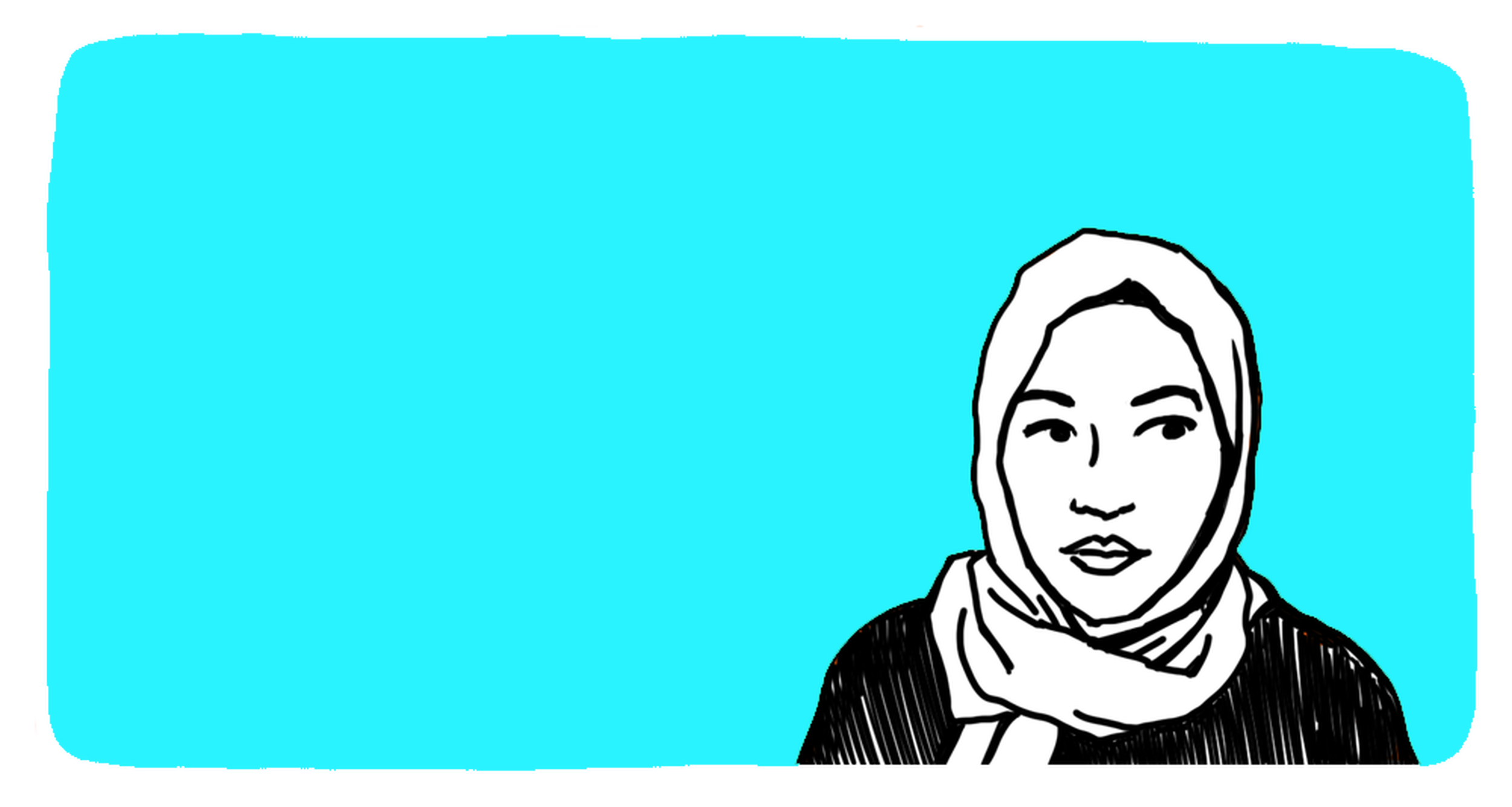
Hadeel Abdel-Nabi The Sprawl's staff writer intern. Illustration: Sam Hester
Finding empathy in journalism
A Q&A with Hadeel Abdel-Nabi
Support independent Calgary journalism!
Sign Me Up!The Sprawl connects Calgarians with their city through in-depth, curiosity-driven journalism. But we can't do it alone. If you value our work, support The Sprawl so we can keep digging into municipal issues in Calgary!
We’ve got good news and bad news.
Bad news first: The Sprawl is losing a kick-ass reporter in Hadeel Abdel-Nabi, our intern staff writer. Hadeel has been part of our team since May, and over that time, she’s dug into a bunch of underreported stories, ranging from racism in the classroom to the Stoney Nakoda Nation taking the Alberta government to court over the sale of water from Kananaskis.
She was the only Alberta reporter to track down the other Jason Kenney for an interview. And earlier this month, Hadeel hosted our most-downloaded Sprawlcast episode ever, about Albertans who are leaving the province.
The good news? Hadeel is going to CBC in Toronto. She’s one of only eight young journalists in Canada receiving the 2020 Joan Donaldson CBC News Scholarship. She’ll be working at the CBC mothership for four months—after which, we hope, she’ll come back!
It’s always been very important to me to create space for empathy within journalism.
What was your favourite part of your role as The Sprawl’s staff writer intern this summer?
Not to be an editor’s pet, but I’ve loved all of it! Especially being a part of The Sprawl community.
Everyone has been so supportive—from the team itself, to the readers. I couldn’t have asked for a better summer. I got to spend my time writing about topics that matter to me, learning new things and figuring out my place in journalism.
The position also challenged me to question my definition of “local journalism.”
There was never a shortage of underreported issues. Whenever I had the opportunity to cover a story like that, I was always moved by how personal the impact was.
It’s always been very important to me to create space for empathy within journalism. So to dig into issues, topics and ideas that impact my city and province pushed me to explore the depths of true empathy.
I think that’s something unique to The Sprawl and other local independent publications like it.
What story did you enjoy working on the most?
I enjoyed working on every project equally, but in different ways. It’s hard to pick a favourite—they’re all my little anxiety babies.
I’m drawn to the simplicity of connecting across time and borders.
Tell us about your letter collection!
You mean my collection of strangers’ sentimental trash? Let’s just say my family hates it. And let’s just say I might need to store it at Loft 112 while I’m gone. And let’s just say I have a problem.
I recently bought a note, scribbled on one of those old phone message pads. I don’t know where it came from originally or what it says.
I just love being able to hold a piece of someone’s history in my hands. It could be an old letter, a random invoice from 1955, a (clean) café napkin covered in doodles.
Most of the sentimental trash I collect is mundane, but I like how intimately human the boring stuff is. I guess I’m drawn to the simplicity of connecting across time and borders.
Or maybe I’m just nosy.
What do you look forward to learning in Toronto?
I’m not sure what to expect! I’m excited to find out how I adapt to such a big change. And maybe I’ll finally learn how to ride a bike—no promises though.
What's something you’d like to report on but haven’t had a chance to?
The Canadian prison industry. I’m coming for you, Correctional Service Canada.
What will you miss the most about Calgary?
Beyond my friends and family, I’m going to miss being a local. It took me most of my life to appreciate the city I grew up in and find where I fit. So I’m really going to miss things like picking up coffee beans at my favourite place.
No one is objective in a society conditioned into favouring the dominant groups.
As an emerging journalist, what would you hope for the future of media/journalism?
As an industry, I think journalism could use a heavy dose of self-reflection. I don’t think we stop frequently enough to question what lenses we bring to our reporting.
I know that traditionally, “objectivity” is the golden rule. But no one is objective in a society conditioned into favouring the dominant groups. No matter how detached we want to think we are from our work, our fingerprints are all over it. From deciding what we believe deserves public attention to finding sources to choosing quotes—the journalist is in there.
So I hope the future of media has a lot more of that understanding. And not because we feel like we “should,” but because we honestly believe that it’s necessary. Otherwise, any variation of “social awareness” is just lip-service.
I also hope that we can start to appreciate our sources more. It’s a big deal to be trusted with someone’s words or story. We need to acknowledge that more.
Support independent Calgary journalism!
Sign Me Up!The Sprawl connects Calgarians with their city through in-depth, curiosity-driven journalism. But we can't do it alone. If you value our work, support The Sprawl so we can keep digging into municipal issues in Calgary!




